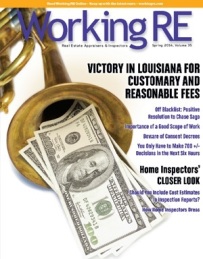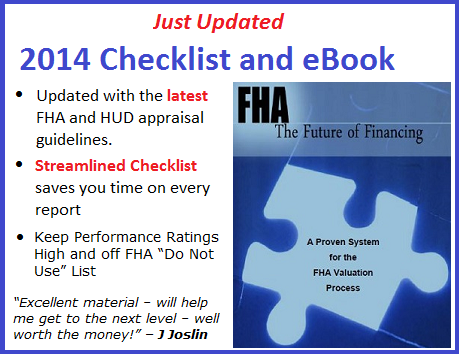 |
>> See Past News Editions >> Click to Print > Slow? Get Busy: Work directly with clients, get paid full-fees and diversify your business. Click here to learn more. > Want to be a better FHA Appraiser? The FHA Checklist and eBook keeps you up-to-date on FHA requirements and helps you be more efficient on FHA Inspections. Click here to learn more. |
Editor’s Note: A federal court in California has certified a class action challenging Bank of America’s failure to pay overtime to staff appraisers. In another case, staff review appraisers stand to receive a settlement averaging over $10,000 each from BOA/LandSafe.
Take a quick survey below!
Court Certifies Class and Approves Nationwide Class Settlement for Review Appraisers
by Bryan Schwartz
United States District Court for the Central District of California, Hon. David O. Carter, certified a class action challenge on behalf of hundreds of real estate appraisers employed by Bank of America and its appraisal subsidiary, LandSafe Appraisal Services, around California, seeking back wages for unpaid overtime, meal and rest period premiums, and other wages and penalties.
Judge Carter also granted his preliminary approval to a $5.8 million settlement on behalf of another group in the case, called Review Appraisers – who verify the Residential Appraisers’ reports. Approximately 370 review appraisers nationwide will soon receive notice of the settlement, which is expected to receive final approval in November 2014, barring any successful objections. Each participant, on average, will net a payment of over $10,000 in the settlement, and the position will be reclassified in 2014 so that Bank of America’s Review Appraisers will be paid overtime going forward.
(story continues below)

(story continues)
Boyd, et al., v. Bank of America, et al
The case in question, Boyd, et al., v. Bank of America, et al., was brought by San Francisco Bay Area attorney Bryan Schwartz along with Schonbrun, Desimone, Seplow, Harris & Hoffman of Los Angeles. The action alleges that Bank of America wrongly called appraisers exempt from wage laws based upon the notion that they were company administrators or policy-makers (like human resources officials) or learned professionals (like attorneys and doctors), who must undergo a prolonged course of specialized academic instruction.
Judge Carter, in Orange County, noted evidence that “Residential appraisers do not supervise anyone, advise management, advise loan officers, negotiate, or bind LandSafe in any way.” Rather, the decision noted that “each report produced by a residential appraiser corresponds to a single mortgage sale by Bank of America.” Because the policies, job descriptions, and state and federal guidelines governing the appraisers were uniform for the whole class, the Court found that a common, predominant question existed as to whether the so-called “administrative exemption” from the wage requirements could apply. The court also found a key common question whether the appraisers are “’primarily engaged in an occupation commonly recognized as a learned . . . profession’ in light of the minimum standards for licensing, certification, and continuing education.” Apart from the extensive on-the-job training, appraisers do not need more than a high school diploma plus several weeks of classes.
(story continues below)

(story continues)
“The Court’s order is a complete victory on our motion seeking to have all appraisers’ claims heard together,” said Schwartz, who argued the motion for the Plaintiffs. “These days, when class certification is under attack by companies and their advocates, trying to keep workers from coming together to vindicate the wage protections, it is refreshing to see a well-reasoned court order which gives the employees a fair chance to fight for their rights.”
“I look forward to representing the class, and to proving that all the residential appraisers are entitled to be paid overtime and be provided meal and rest periods when they work long hours – as is so often the case,” said Boyd, the class representative. Though Bank of America challenged the “adequacy” of several of the class representatives, the court found each of them suitable.
For more on this issue, click here.
About the Author
Bryan Schwartz (BryanSchwartzLaw.com) is a leading California attorney representing workers in wage, discrimination, and whistleblower claims. In recent years, he has represented residential and commercial appraisers in multiple, nationwide class action lawsuits against their employers. For more information about this case, Boyd, et al. v. Bank of America, et al., please contact Bryan Schwartz: Bryan@BryanSchwartzLaw.com.
>Click Here to take WRE/OREP Appraisal Process Satisfaction Survey.
1. How would you rate the appraisal submission/review process overall with the clients you work for?
-Generally Reasonable
-Sometimes Unreasonable
-Often Unreasonable
-Almost Always Unreasonable
2. You refuse to work with clients that have a difficult/time-consuming appraisal submission/review process:
-Always
-Frequently
-Sometimes
-Not Often Enough
3. Are excessive and sometimes questionable demands by your client/lender/AMC impacting your business?
-Frequently/Often
-Sometimes
-Rarely/Never
We’re always listening: Send your story submission/idea to the Editor: dbrauner@orep.org.


by Bryan Schwartz
This is not about denigrating the appraiser profession or anyone in it. The question is not whether, subjectively, appraisers as a whole, or any of them, are “learned professionals.” The question is whether the appraiser position falls within the narrow state and federal professional exemptions, based upon what formal educational requirements the position requires of all appraisers. It is about banks and other companies needing to pay appraisers overtime for the long hours you work away from your families, and meal period premiums in California for the many lunches you must skip. Simply put, the plaintiffs maintain that employers are not exempt from paying you extra wages, regardless of what particular educational background any individual appraisers have, or the long on-the-job training you must undergo, because the appraiser position does not require – as a mandatory prerequisite – a prolonged course of specialized academic instruction, like doctors, lawyers, and CPAs. There is no university advanced degree in appraisal science that you are required to undertake for many months or years before you can become an appraiser, anywhere in America. There is not, for example, a year-long classroom appraisal program that any appraiser is required to undertake before getting licensed. The employers, plaintiffs assert, are just trying to pay you less, by sticking a square peg in a round hole, seeking to extend to appraisers an exemption meant for certain professions where a prolonged course of specialized academic instruction is mandatory.
-by JM Stark
Regarding the California settlement with BofA – kudos – but it appears this court holds the appraisal profession in similar esteem: “The court also found a key common question whether the appraisers are primarily engaged in an occupation commonly recognized as a learned . . . profession in light of the minimum standards for licensing, certification, and continuing education. Apart from the extensive on-the-job training, appraisers do not need more than a high school diploma plus several weeks of classes..”
AZ Board of Appraisal
AFTER 01/01/15
EDUCATION: 4-yr college degree required
APPRAISAL SPECIFIC EDUCATION: 50 hours additional education required in specific courses AND a 15-hour USPAP class with exam to be taken within 2 years of application
EXPERIENCE Must have 500 hours of additional experience working with certified appraisers on complex assignments…
Wonder if the appraisal profession will finally be considered “learned” after the first of this coming year.
(Not to be listed as a trainee)
-by Edd Gillespie
Thanks for the update. Lol with respect to appraisers being part of an alleged “learned profession.” What a stretch, but then we are speaking of BOA avoiding accountability. The question I have is why this particular class of appraiser victims stuck around the secondary mortgage market long enough to accumulate $10,000.00 in actual damages. It seems to me that even if BOA wasn’t recognized as the predator it is that minimal instincts of survival and self preservation would have kicked long before $10,000.00, but then I’m told that.the top priority for many appraisers is to feed their family.
-by Michael Agnew
Great to know the courts think we are not a “learned” profession needing only a high school diploma and a few classes. Says volumes about our designation process of the appraisal organizations.
-